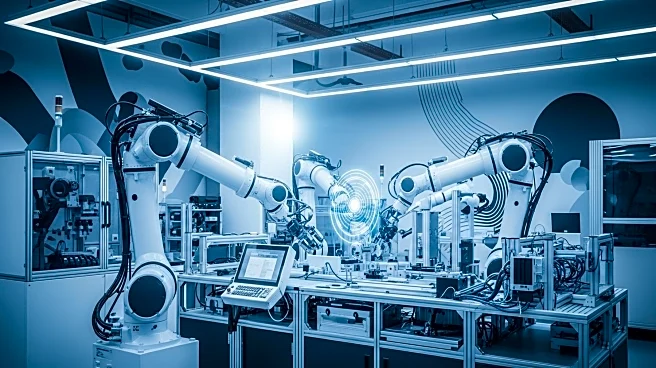What's Happening?
Vietnam's industrial sector is undergoing a significant transformation, moving from a focus on outsourcing and assembly to technological ownership and innovation. The country's manufacturing and processing sector, which accounts for 25% of GDP, is shifting towards high-tech industries such as semiconductors and artificial intelligence. Vietnamese entrepreneurs are increasingly mastering technology, contributing to the nation's industrial growth. The government has implemented policies to support this transition, including resolutions to boost science, technology, and innovation. Vietnam aims to establish key programs in strategic sectors by 2030, positioning itself as a major player in the global tech value chain.
Why It's Important?
Vietnam's shift towards innovation and high-tech industries is crucial for its economic development and global competitiveness. By moving away from low-value assembly, the country is enhancing its industrial capabilities and increasing its value-added content. This transition is expected to attract foreign investments and strengthen Vietnam's position in the global semiconductor and AI markets. The government's supportive policies and focus on strategic sectors are likely to drive sustainable industrial growth, reducing reliance on foreign technology and boosting domestic innovation. As Vietnam integrates deeper into the global value chain, it may become a key player in high-tech industries.
What's Next?
Vietnam's continued focus on innovation and high-tech industries is likely to attract more foreign investments and partnerships. The government's efforts to improve institutions and support domestic enterprises will be crucial in meeting global standards and accessing international markets. As Vietnam establishes key programs in strategic sectors, it may become a hub for high-tech manufacturing and research. The country's progress in semiconductors and AI could lead to increased collaborations with global tech giants, further enhancing its industrial capabilities.
Beyond the Headlines
Vietnam's industrial transformation raises questions about the challenges of transitioning from outsourcing to innovation. The country's ability to develop its own technology and compete globally will depend on its success in overcoming institutional barriers and fostering a culture of innovation. As Vietnam moves towards high-tech industries, it will need to address issues such as technology transfer, talent development, and infrastructure improvements. The government's policies and strategic vision will play a critical role in ensuring that Vietnam's industrial growth is sustainable and inclusive.









